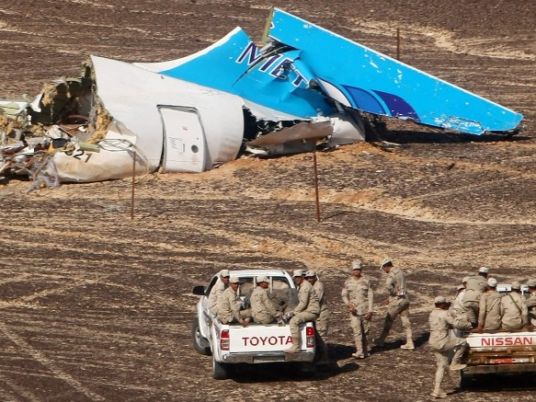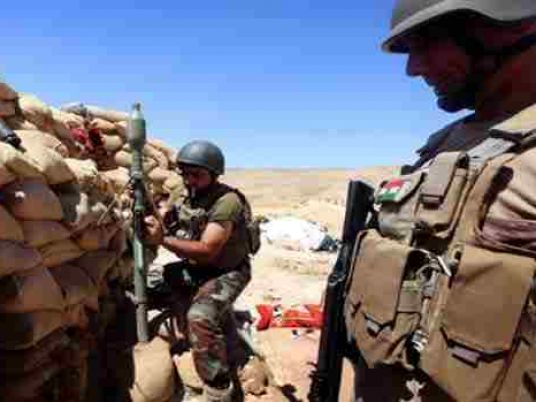
Was Saturday, October 31, 2015, the day ISIS emerged as a global terrorist threat?
That's when a Russian airliner broke apart in midair and crashed into Egypt's Sinai peninsula, killing all 224 people aboard. If ISIS blew up the plane, as it claims, it would arguably be the most significant terrorist attack since 9/11.
Until now, ISIS has been known primarily for devising ever-more brutal ways to kill hostages taken in the Middle East, as well as for the massacre of perhaps 1,700 Iraqi soldiers in the northern Iraqi city of Tikrit in 2014.
But the downing of a civilian airliner — the most prized target of international terrorist groups — would mark the announcement by ISIS that it was capable of harming civilians almost anywhere in the world. The group would be laying down a global marker, much as the 1998 bombings of the US embassies in Kenya and Tanzania and the 2000 bombing of the USS Cole in the Yemeni port of Aden first demonstrated the global reach of Al-Qaeda.
ISIS had already attacked internationally
There were already signs ISIS was emerging as an international force.
In January, Belgium thwarted a major gun and bomb plot by ISIS recruits believed to have been directed by the leadership of the group in Syria. In April, French police arrested a French radical directed in Turkey by French ISIS recruits to attack a church in Paris.
A suspected ISIS gunman trained in Libya killed 30 British tourists and others on a Tunisian resort beach in June. ISIS also claimed a gun massacre of Western tourists at a Tunis museum in March, but it's still unclear whether ISIS or a local Al-Qaeda affiliate carried out that attack.
In August, another suspected ISIS recruit attempted to attack a high-speed passenger train on the Belgian-French border but was overpowered by three Americans. And in October, two suicide bombers whom Turkish investigators suspect were dispatched by ISIS in Syria killed more than 100 people at a rally in Ankara, Turkey.
Fears over ISIS' international reach have been compounded by the fact that European officials estimate up to 6,000 European extremists have traveled to fight in Syria and Iraq, and 1,500 of them have returned home.
Still, the downing of a civilian airliner would usher in a significantly higher global profile for the group. The death toll, at 224 people, would make it the deadliest terrorist attack since 9/11 aside from the Beslan school siege in Russia in 2004, in which more than 300 people died.
All of this is based on a big "if." Investigators have not conclusively determined what brought down the Russian airliner or even if it was terrorism.
Conventional bomb well within ISIS-Sinai's capabilities
In the days after the crash, much commentary centered on the fact that the ISIS affiliate in Sinai was not known to have missiles that could hit an airplane at 30,000 feet.
But if it turns out that a conventional explosive device was smuggled onto the plane by an airport insider — as now seems to be one of the main theories — that would be well within the reach of the ISIS affiliate.
If that branch recruited somebody working at Sharm el-Sheikh airport, from which the doomed airliner departed, that could explain the lack of detail in its claim of responsibility, which has baffled terrorism analysts.
On Saturday, the group issued an eight-line statement saying it was responsible for "bringing down" the Russian airliner but provided no corroboration.
On Wednesday, it released an audiotape again claiming responsibility but said it would not, for the time being, reveal how it carried out the attack, and it would be up to investigators to figure that out.
One possible explanation for this lack of detail would be to protect a mole recruited inside Sharm el-Sheikh airport.
A danger to other airports?
If ISIS did recruit an airport insider, the worry will be that it might have recruited moles at other airports in the Middle East and perhaps even in the United States. A case in point was Abdirahmaan Muhumed, an American ISIS fighter who was killed in Syria in the summer of 2014 — and who once worked as a cleaner at the Minneapolis-St. Paul airport in Minnesota.
More fertile ground for recruitment
If ISIS downed the Russian jet, its standing in the global Jihadi movement would be enhanced almost beyond measure due to the anger felt by many Sunni Muslims toward Russia for propping up Syrian leader Bashar al-Assad — a man recently labeled by New York Times columnist Thomas Friedman as "the barrel-bombing murderer of more Sunnis than anyone on the planet."
But the act could have significant geopolitical repercussions. Russia could deepen its involvement in the Syrian war and pivot more toward targeting ISIS.
That may have been a risk the group was willing to take, since the feat — if it's determined to be the work of ISIS — would greatly strengthen the group in its rivalry with al Qaeda, providing it with a recruiting tool to attract yet more foreign fighters.
The news would hurt the airline and tourism industries, as well as the wider economy in Egypt and other Middle Eastern countries, and worsen unemployment — making the region yet more fertile for Jihadi recruitment and, frighteningly, marking ISIS' emergence as a significant player in terrorism worldwide.

